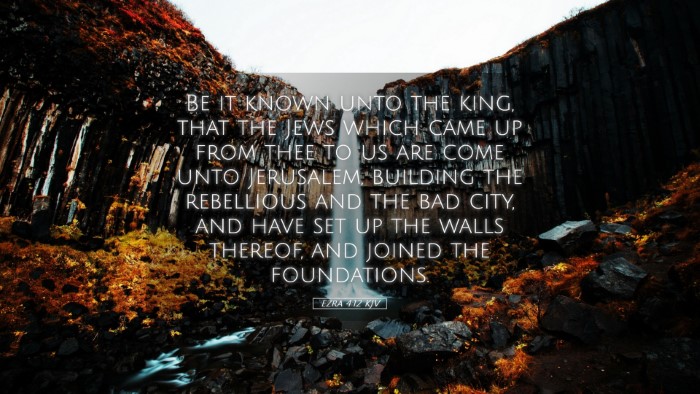Old Testament
Genesis Exodus Leviticus Numbers Deuteronomy Joshua Judges Ruth 1 Samuel 2 Samuel 1 Kings 2 Kings 1 Chronicles 2 Chronicles Ezra Nehemiah Esther Job Psalms Proverbs Ecclesiastes Song of Solomon Isaiah Jeremiah Lamentations Ezekiel Daniel Hosea Joel Amos Obadiah Jonah Micah Nahum Habakkuk Zephaniah Haggai Zechariah MalachiEzra 4:12
Ezra 4:12 KJV
Be it known unto the king, that the Jews which came up from thee to us are come unto Jerusalem, building the rebellious and the bad city, and have set up the walls thereof, and joined the foundations.
Ezra 4:12 Bible Commentary
Commentary on Ezra 4:12
Ezra 4:12 states, "Be it known unto the king that the Jews which came up from thee to us are come unto Jerusalem, building the rebellious and the bad city, and have set up the walls thereof, and joined the foundations." This verse is pivotal in understanding the opposition faced by the Jews during their efforts to rebuild Jerusalem and its temple under Persian rule. Below we explore insights from esteemed public domain commentaries to unveil the deeper theological and historical implications of this scripture.
Contextual Background
The book of Ezra details the return of the exiles from Babylonian captivity and the rebuilding of the temple in Jerusalem. This verse marks a critical moment of resistance as adversaries of the Jews, realizing the significance of their undertaking, sought to undermine their efforts by appealing to the Persian king.
Matthew Henry's Commentary Insights
According to Matthew Henry, the adversaries of the Jews were deeply concerned that the rebuilding of Jerusalem posed a threat to the stability of the Persian Empire. He notes that they describe the city as "rebellious and bad," indicating their perception that the restoration of Jerusalem was an act of insurrection against the authority of Persia. This reflects a strategic attempt to manipulate political concerns to halt the rebuilding process.
Henry emphasizes that the Jews, despite facing such accusations, were driven by a divine imperative to restore their city and worship. This highlights the theme of spiritual resilience in the face of political opposition, a message that resonates with contemporary readers who may face similar challenges.
Albert Barnes' Commentary Insights
Albert Barnes elaborates on the term "rebellious," explaining that it originated from the enemies’ desire to mischaracterize the Jews’ motives. Barnes notes that the accusation served to alarm the authorities, portraying the Jews as a potential threat to the peace of the region. He provides insight into the political dynamics at play, suggesting that these accusations aimed to incite fear in King Artaxerxes, ultimately seeking to suppress the rebuilding of Jerusalem.
Moreover, Barnes points out that the foundation of the city was vital for the Jewish identity and worship practices. The efforts to rebuild were not merely physical but were integral to the restoration of the covenant community. This indicates that the opposition was not merely a matter of politics but also of significant spiritual importance, reminding modern readers of the intertwined nature of faith and action.
Adam Clarke's Commentary Insights
Adam Clarke underscores the historical significance of this accusation by detailing the historical backdrop of the city's rebellious reputation. He explains that Jerusalem had previously been a site of insurrection against foreign rulers, thus making the menacing allegations resonate with those unfamiliar with the current intentions of the returning exiles.
Clarke articulates that the phrase "have set up the walls thereof, and joined the foundations," is not merely an indictment but also a recognition of the progress made by the Jews. This acknowledgment serves both to highlight the urgency of their mission and to challenge the political landscape. Clarke reinforces the notion that spiritually oriented actions often provoke worldly opposition, a lesson that remains relevant in today's context of faith-based initiatives.
Theological Reflections
The accusations leveled against the Jews in Ezra 4:12 provide rich fodder for theological reflection. These verses connect to broader themes within Scripture regarding fidelity to God amidst opposition. The Jews' response to this conflict can be likened to other biblical figures who faced unwarranted persecution yet remained steadfast in their covenantal obligations.
- Faithfulness: The Jews exemplified faithfulness in their calling, reminiscent of characters like Nehemiah, who, despite threats, persevered for the sake of their community and worship.
- Divine Oversight: The situation exemplifies God's sovereignty over geopolitical affairs. Even through earthly opposition, God’s purpose is secured.
- Community Identity: The rebuilding of Jerusalem highlights the importance of communal identity in faith. As today's believers reflect on their identity, they may draw parallels to their own communities facing external challenges.
Practical Applications
For pastors, students, theologians, and Bible scholars, the lessons from Ezra 4:12 encourage the following applications:
- Engagement with Culture: Much like the Jews, contemporary communities of faith are called to engage positively with cultural and political structures while maintaining the integrity of their mission.
- Resilience in Adversity: Recognizing that opposition is often a part of fulfilling a divine mission can embolden believers to persevere, even against harsh scrutiny.
- Constructive Dialogue: Engaging adversaries with truth and love, rather than in hostility, reflects Christ’s teachings and can mitigate misunderstandings.
Conclusion
In conclusion, Ezra 4:12 serves as a poignant reminder of the complexities involved in restoring values and beliefs within a challenging socio-political landscape. The insights gleaned from various commentaries emphasize the importance of understanding the historical context, the spiritual significance of the Jews' mission, and the modern implications for believers today. As the church continues to navigate its identity and mission, lessons from Ezra highlight the necessity of faithfulness amidst opposition, crafting a narrative of hope and resilience.


